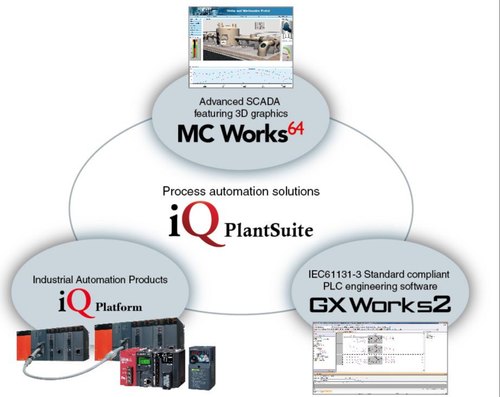1. EXECUTIVE SUMMARY
- CVSS v3 9.4
- ATTENTION: Exploitable remotely
- Vendor: Mitsubishi Electric
- Equipment: MC Works64, MC Works32
- Vulnerabilities: Out-of-bounds Write, Deserialization of Untrusted Data, Code Injection
2. RISK EVALUATION
Successful exploitation of these vulnerabilities may allow remote code execution, a denial-of-service condition, information disclosure, or information tampering.
3. TECHNICAL DETAILS
3.1 AFFECTED PRODUCTS
The following products versions are affected:
- MC Works64 Version 4.02C (10.95.208.31) and earlier, all versions
- MC Works32 Version 3.00A (9.50.255.02)
3.2 VULNERABILITY OVERVIEW
3.2.1 OUT-OF-BOUNDS WRITE CWE-787
A specially crafted communication packet sent to the affected MC Works64 Broker64 or MC Works32 Broker32 systems could cause a denial-of-service condition or allow remote code execution.
CVE-2020-12011 has been assigned to this vulnerability. A CVSS v3 base score of 8.1 has been calculated; the CVSS vector string is (AV:N/AC:H/PR:N/UI:N/S:U/C:H/I:H/A:H).
3.2.2 DESERIALIZATION OF UNTRUSTED DATA CWE-502
A specially crafted communication packet sent to the affected MC Works64 platform services could cause a denial-of-service condition due to improper deserialization.
CVE-2020-12015 has been assigned to this vulnerability. A CVSS v3 base score of 7.5 has been calculated; the CVSS vector string is (AV:N/AC:L/PR:N/UI:N/S:U/C:N/I:N/A:H).
3.2.3 DESERIALIZATION OF UNTRUSTED DATA CWE-502
A specially crafted communication packet sent to the affected MC Works64 Workbench Pack & Go function could allow remote code execution due to improper deserialization.
CVE-2020-12009 has been assigned to this vulnerability. A CVSS v3 base score of 7.5 has been calculated; the CVSS vector string is (AV:N/AC:L/PR:N/UI:N/S:U/C:N/I:N/A:H).
3.2.4 IMPROPER CONTROL OF GENERATION OF CODE (‘CODE INJECTION’) CWE-94
A specially crafted message sent from a custom client function that interfaces to the affected MC Works64 GridWorX server may allow the execution of certain arbitrary SQL commands remotely and disclose internal data or allow internal data tampering.
CVE-2020-12013 has been assigned to this vulnerability. A CVSS v3 base score of 9.4 has been calculated; the CVSS vector string is (AV:N/AC:L/PR:N/UI:N/S:U/C:H/I:H/A:L).
3.2.5 DESERIALIZATION OF UNTRUSTED DATA CWE-502
A specially crafted communication packet sent to the affected MC Works64 FrameWorX server could allow remote code execution and a denial-of-service condition due to the deserialization vulnerability.
CVE-2020-12007 has been assigned to this vulnerability. A CVSS v3 base score of 7.5 has been calculated; the CVSS vector string is (AV:N/AC:L/PR:N/UI:N/S:U/C:N/I:N/A:H).
3.3 BACKGROUND
- CRITICAL INFRASTRUCTURE SECTORS: Critical Manufacturing
- COUNTRIES/AREAS DEPLOYED: Worldwide
- COMPANY HEADQUARTERS LOCATION: Japan
3.4 RESEARCHER
Tobias Scharnowski, Niklas Breitfeld, Ali Abbasi, and Yehuda Anikster of Claroty; Pedro Ribeiro and Radek Domanski of Flashback; Ben McBride of Oak Ridge National Laboratory; and Steven Seeley and Chris Anastasio of Incite reported these vulnerabilities to ICONICS, a group company of Mitsubishi Electric.
4. MITIGATIONS
Mitsubishi Electric recommends updating to the latest software version or applying security patches.
Users can get the installer of the latest software version or security patches in one of the following ways:
- Download the latest software versions from the MC Works Vulnerability Information website.
- Contact a Mitsubishi Electric representative.
CISA recommends users take defensive measures to minimize the risk of exploitation of this vulnerability. Specifically, users should:
- Minimize network exposure for all control system devices and/or systems, and ensure that they are not accessible from the Internet.
- Locate control system networks and remote devices behind firewalls, and isolate them from the business network.
- When remote access is required, use secure methods, such as Virtual Private Networks (VPNs), recognizing that VPNs may have vulnerabilities and should be updated to the most current version available. Also recognize that VPN is only as secure as the connected devices.
CISA reminds organizations to perform proper impact analysis and risk assessment prior to deploying defensive measures.
CISA also provides a section for control systems security recommended practices on the ICS webpage on us-cert.gov. Several recommended practices are available for reading and download, including Improving Industrial Control Systems Cybersecurity with Defense-in-Depth Strategies.
Additional mitigation guidance and recommended practices are publicly available on the ICS webpage on us-cert.gov in the Technical Information Paper, ICS-TIP-12-146-01B–Targeted Cyber Intrusion Detection and Mitigation Strategies.
Organizations observing any suspected malicious activity should follow their established internal procedures and report their findings to CISA for tracking and correlation against other incidents.
No known public exploits specifically target these vulnerabilities. High skill level is needed to exploit.
Source:


Stay connected